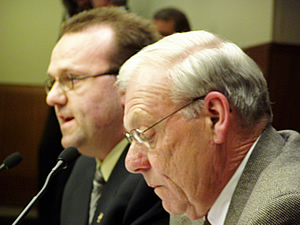Audio
Photos
More from MPR
Your Voice
| |||||||||||||||||||||||||||||||||||||||||||||||||||||
Stadium bill clears House committee despite tough questions
March 24, 2004
 |
| Twins executive Jerry Bell, objected to an amendment calling for a referendum on a new stadium. (MPR Photo/Michael Khoo) |
St. Paul, Minn. — On a divided voice vote, the committee agreed to move the stadium package forward, but not before subjecting the plan to roughly seven hours of testimony, debate, and skeptical questions. The plan is derived from an initiative unveiled last week by Gov. Pawlenty that would build separate, new facilities for the Minnesota Twins and Vikings at a total cost expected to top $1 billion.
The teams would be required to pay at least one-third of the costs, with the rest to be subsidized through local tax increases and a portion of the sales and income taxes generated in or around the new ballparks.
 | |||
Lawmakers immediately zeroed in on that last piece, arguing that the state has never before offered private businesses the chance to plow a portion of their tax obligations back into their own development plans.
DFLer Ann Lenczewski of Bloomington was quick to criticize that provision, saying it establishes a dangerous precedent.
"We'll say, 'If you'll stay, we'll let you take your taxes that you owe -- as a citizen of this state, as a player in our economy -- and we'll let you fold them back into your project.' And that's really what this is doing," she said.
The question of the tax diversion and several other financing pieces were temporarily set aside for future hearings, but the debate was a pointed reminder of the many divisions the stadium issue has created.
The teams claim that they're unable to compete in the 22-year-old Metrodome, and will require the additional revenues expected from new stadiums to survive. And gubernatorial chief of staff Dan McElroy says using a portion of the sales and income taxes collected in the stadiums makes sense, arguing that professional sports are unlike other businesses.
McElroy says the Twin and the Vikings offer a unique visibility that raises Minnesota's profile.
"It's their contribution to our brand value as a metropolitan area. To what they do of the image that those around the country or around the world have of our community because they have seen us on television, read us about it in the newspaper, seen a halftime presentation from an all-star game or a Superbowl," he said.
Some committee members also complained that the bill's loose framework doesn't do enough to pin down the teams' contributions. An amendment that would have required those contributions to be up-front and in cash was withdrawn, however, after testimony from the Twins that it would sink the franchise's hopes of fielding competitive teams.
Both teams have also opposed putting local tax hikes before a voter referendum. Hennepin County, which is seeking a Twins ballpark, and Anoka County, which is courting the Vikings, are both on the record opposing a referendum requirement. St. Paul officials, however, say they're willing to put their Twins stadium plan to a vote.
But Twins Sports president Jerry Bell told the committee that voter approval could inject too much risk into the package.
"The reason I'm opposed to it, though, is I don't have a Plan B. If a referendum fails, I cannot come back to you and ask you to override what the voters have said in a segment of the state," Bell said.
Lawmakers are likely to revisit the issue of a referendum during future debates. As the bill now stands, city or county officials could impose local bar, food, or lodging taxes without voter approval. However, the measure was amended to require that any local increases in the general sales tax would require a second round of legislative approval next year.
Several opponents of publicly-funded ballparks also presented testimony. Ricky Rask of Minneapolis, who played a key role in defeating earlier stadium plans, told lawmakers that many citizens have grown disillusioned by the issue's re-emergence despite long-standing public opposition. Many, she says, have simply given up.
"They won't call anymore. Because they don't believe the process works. And I think that's a real sad commentary," she said.
The bill now goes to the House Government Operations Committee. Leaders in the DFL-controlled Senate say they won't take action on companion legislation until the House takes a vote.
|
News Headlines
|
Related Subjects
|

